Understand your legal options and see if your case qualifies for a potential settlement.
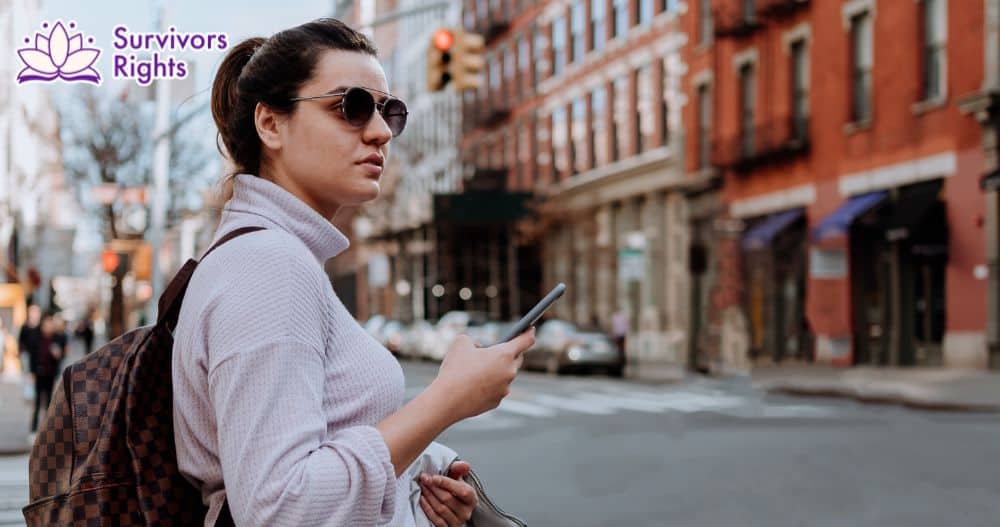
When Lyft launched in 2012, it promised something different from its bigger, more aggressive competitor, Uber. Lyft marketed itself as the “friendly” rideshare company—a safer, community-driven alternative where passengers could feel comfortable hopping into a stranger’s car. But behind the pink mustache branding and feel-good messaging, Lyft passengers were experiencing the same harrowing nightmare that had already begun unfolding in Uber rides.
While Uber’s sexual assault crisis has dominated headlines, thousands of Lyft passengers have also suffered terrifying, life-altering assaults at the hands of drivers. Reports of drivers groping, stalking, drugging, and even assaulting passengers have surfaced in horrifying numbers. And Lyft, just like Uber, turned a blind eye.
Lyft had a chance to learn from Uber’s failures—to implement rigorous background checks, actually enforce safety policies, and take proactive measures to protect riders. Instead, it followed Uber’s lead in prioritizing rapid growth and profit over passenger safety.
While Lyft publicly condemned sexual assault, behind the scenes, it continued approving drivers with criminal histories, failing to act on assault reports, and misleading riders into thinking they were in good hands.
The result?
Between 2017 and 2022, Lyft disclosed 6,809 reports of sexual assault.
That’s nearly four incidents of sexual assault in Lyft rides every day. While some may argue that the number of Lyft sexual assaults is miniscule in comparison to the total number of rides, even one incident is one too many. Not only that, but the actual number of sexual assaults that occur in Lyft rides is likely much higher, as many cases are not reported.
February 9. 2026
Lyft Sexual Assault Lawsuits Centralized in Federal MDL
A federal panel has decided that all Lyft passenger sexual assault lawsuits filed in federal courts around the country will now be grouped together in one centralized U.S. District Court. The cases now comprise a single proceeding in the Northern District of California, where one judge will oversee early motions and evidence gathering related to shared claims about Lyft’s safety practices.
Although the number of Lyft lawsuits is far smaller than the nearly 3,000 cases pending against Uber, the court noted that the Lyft cases raise the same core questions across districts, including how the company screened drivers and responded to reports of sexual misconduct. By consolidating the lawsuits now, the panel aimed to streamline discovery early, avoid inconsistent rulings, and efficiently manage claims that are expected to continue growing as more survivors come forward.
February 6, 2026
Fort Wayne, IN Lyft Driver Takes Plea Deal in Sexual Assault Case
A Fort Wayne Lyft driver accused of sexually assaulting a passenger resolved his criminal case through a plea deal. The driver pleaded guilty to sexual battery after prosecutors dropped a rape charge, highlighting how individual criminal cases involving Lyft drivers continue to surface as broader civil litigation against the rideshare company moves forward nationwide. [SOURCE: 21AliveNews.com]
February 3, 2026
New Jersey Court Upholds Conviction of Lyft Driver in Sexual Assault of Minor
A New Jersey appeals court has upheld the conviction of a former Lyft driver who was found guilty of sexually assaulting and endangering a 15 year old girl he met while working as a rideshare driver, rejecting his effort to have the verdict overturned. The driver was convicted in 2023 on multiple felony charges after evidence showed the sexual relationship began during a Lyft ride in 2019 and continued through subsequent meetings and text messages. Although he received a sentence of up to seven years in state prison, he was released on parole in December 2025. Appellate judges ruled that the victim’s age was clearly established through trial testimony and investigative evidence, dismissing the appeal as legally unsupported and allowing the conviction to stand. [SOURCE: NJ101.5]
January 20, 2026
Federal Lawsuit Filed By Georgia Woman
A Georgia woman has filed a federal lawsuit against Lyft alleging she was sexually assaulted by her driver during a ride requested through the app in September 2025. She claims the driver stopped the vehicle after she turned on the interior light, exited the car, and groped her while she was retrieving items that had spilled from her purse, before attempting to unzip his pants. The lawsuit alleges Lyft failed to provide adequate passenger safety protections, continued to charge her for the ride after the assault, and misrepresented the safety of its service, seeking to hold the company liable for negligence and related claims. [LEARN MORE]
January 14, 2026
A woman reported being sexually assaulted after a late night rideshare pickup in Tallahassee, saying she lost consciousness after drinking water offered by the driver. A man whose vehicle matched her description was later arrested and charged with sexual battery.
November 17, 2025
A Colorado woman has filed a federal lawsuit alleging that Lyft failed to address what she calls a long running crisis of sexual predators operating as drivers, claiming one of its drivers sexually assaulted her outside her home after a ride in July 2024. The complaint argues that Lyft ignored years of warnings, citing thousands of reported assaults nationwide and multiple high profile Colorado cases. It also criticizes the company’s lack of fingerprint background checks, weak monitoring, and opposition to safety legislation. The plaintiff, who remains anonymous, seeks more than seventy five thousand dollars in damages, asserting Lyft directly contributed to the assault by failing to uphold its duty to protect passengers.
November, 15, 2025
An investigation by Boston news station WCVB revealed that a sexually assaulted Lyft passenger saw rape charges against her driver dropped because a flaw in Massachusetts law requires prosecutors to prove the driver knew or should have known she was too intoxicated to consent. Prosecutors say this standard makes ride share assault cases nearly impossible to prosecute, even when evidence suggests the rider was incapacitated. In response, State Senator Rebecca L. Rausch has introduced legislation that would make it a crime for a ride share driver to engage in sexual activity with a passenger during a ride, closing the loophole that has prevented cases involving Lyft and other ride share companies from moving forward.
October 8, 2025
A plaintiff in one of several sexual assault lawsuits against Lyft has asked a federal panel to combine at least 17 similar cases into a single proceeding. The motion, filed with the U.S. Judicial Panel on Multidistrict Litigation (JPML), requests that the cases be transferred to the Northern District of California, where a similar multidistrict litigation (MDL) involving Uber is already underway before Judge Charles Breyer.
The lawsuits accuse Lyft of failing to protect passengers from sexual assaults and of neglecting to implement adequate safety measures to prevent attacks by its drivers. Centralizing the cases could streamline pretrial discovery and reduce inconsistent rulings, allowing survivors nationwide to share evidence about Lyft’s alleged negligence.
If the JPML approves the consolidation, the move would mark the first national coordination of sexual assault lawsuits against Lyft—mirroring the ongoing federal proceedings against Uber. The decision could also influence how future rideshare safety lawsuits are handled across the United States.
October 7, 2025
A Phoenix Lyft driver, Mohammad Al Bishawi, has been arrested after DNA evidence linked him to two separate sexual assault cases, one involving a rideshare passenger in Gilbert and another a massage therapist in Phoenix. Both victims identified him, and he now faces multiple charges including sexual assault and kidnapping.
September 24, 2025
Court filings reveal that 26-year-old Alejandro Rendon Segovia has been charged with first‑degree aggravated kidnapping and object rape, as well as obstruction of justice, following a February 2024 Lyft ride in Salt Lake Valley. Prosecutors allege he deviated from the intended route, made stops, and assaulted the intoxicated passenger, who later escaped and walked home. Bruising and injury evidence emerged in a medical exam. Authorities believe there may be additional victims and are urging anyone with similar experiences to come forward. Lyft has confirmed the driver is no longer with the platform and said it’s cooperating with the investigation, KSLTV 5 News reported.
August 29, 2025
The Charlotte Observer reported that a woman has filed a federal lawsuit against Lyft, claiming a driver raped her in Charlotte in February 2024 after she became unconscious from alcohol during the ride. According to the suit, the driver assaulted her while she was incapacitated, and she awoke during the attack and managed to flee. The lawsuit alleges Lyft failed to implement adequate safety measures despite knowing of similar past assaults, calling it a systemic failure. The survivor continues to suffer from serious emotional trauma. Lyft has not yet responded to the allegations.
August 11, 2025
Despite Uber sexual assaults dominating the headlines — especially after a New York Times investigation of unsealed court documents revealed over 400,000 cases of sexual misconduct reported by Uber from 2017–2022, more than 3,000% higher than what the company admitted in its published safety reports — its smaller rival Lyft is facing hundreds of sexual assault lawsuits of its own. One of the most recent incidents occurred in Somerville, Massachusetts.
On August 9, 2025, a female passenger reported to police from a local hospital that she had been sexually assaulted by her Lyft driver. Investigators say the driver, Luis Carlos Ramos Teixeira, 27, of Brockton, picked her up in Boston and drove her to her home in Somerville. Once there, he allegedly got into the back seat of the vehicle and assaulted her.
Following the report, Somerville Police, with assistance from Massachusetts State Police and Brockton Police, located and arrested Teixeira the next day on charges of rape and indecent assault and battery on a person over fourteen. He was arraigned in Somerville District Court and ordered held without bail pending a dangerousness hearing, according to the Middlesex County District Attorney’s Office.
This case is the latest example of why Lyft, like Uber, is under growing legal and public pressure to address passenger safety, and why survivors are increasingly stepping forward to take legal action.
Meanwhile, in upstate New York, Lyft and Uber driver Thomas F. Cipriano, of Halfmoon, NY was arrested on August 7 for allegedly sexually assaulting a minor male passenger under the age of 15. According to the Saratoga County Sherrif’s Office, Cipriano was charged with felony second-degree attempted rape, unlawful imprisonment, and misdemeanor endangering the welfare of a child.
June 30, 2025
On June 25, 2025, a Travis County jury convicted former Lyft driver Maurys O. Madruga-Mesa of aggravated kidnapping and sexual assault for a May 2024 attack on a female passenger in Austin, CBS Austin reported. The driver deviated from the planned route and made multiple stops before committing the assault. Madruga-Mesa was sentenced to 10 years in prison for sexual assault and received a probated five-year sentence for kidnapping.
June 23, 2025
In Harris County, Texas, a Lyft driver is wanted for indecent exposure after allegedly subjecting a female passenger to a disturbing ordeal during an April 2024 ride. According to investigators, 45-year-old James Turner made unwanted advances and inappropriate comments before pulling into a secluded area, exposing himself, and attempting to physically force himself on the passenger. The woman reported that Turner said, “You made me do this,” and tried to touch her inappropriately until she called her spouse, prompting him to stop. She later identified Turner in a photo lineup and noted a distinctive tattoo, which helped confirm his identity. Authorities are still searching for Turner.
June 13, 2025
A Lyft driver from Valley, AZ, 46-year-old Arthur S. Williams, has been arrested and charged with kidnapping and sexual assault after allegedly attacking a passenger following a January 2025 ride in Buckeye. The victim told police that Williams made inappropriate comments during the ride and later assaulted her outside his vehicle. DNA collected from the victim matched Williams, who denied any memory of the ride. Investigators also linked his DNA to a separate, unsolved case from 2012. Lyft provided driver information following a police search warrant, leading to Williams’ arrest on June 5.
June 4, 2025
A Lyft driver from Joliet has been charged with criminal sexual assault and abuse of a 28-year-old woman who had requested a ride home after drinking at a Lockport bar. According to prosecutors, Guylain Mundabi allegedly assaulted the woman inside his vehicle on January 21, 2024, before forcibly removing her and fleeing. He was formally charged on May 28 following a Lockport Police investigation. A judge has ordered Mundabi held without pretrial release, citing public safety concerns. His next court appearance is scheduled for June 18.
May 9, 2025
The Texas Lawbook reports that Lyft has settled a lawsuit with a Dallas-area passenger who was sexually assaulted by a driver in 2021. The driver, Hamidreza Farahbakhshsadeh, had prior complaints of sexual misconduct but remained active on the platform until his arrest. He was convicted of aggravated sexual assault in January 2025 and sentenced to 12 years in prison. The plaintiff’s attorney emphasized the need for rideshare companies to implement stronger safety measures to protect passengers. This case is yet another illustration of ongoing concerns about Lyft neglecting its responsibility in ensuring rider safety and addressing prior misconduct allegations against drivers.
April 30, 2025
Local media reported that a high school student in Tenafly, NJ, jumped from a moving Lyft vehicle after becoming concerned when the 70-year-old driver missed a turn toward the teen’s home. The student sustained minor injuries. Authorities determined the incident did not appear to be an attempted abduction; the driver explained he was hearing-impaired and had simply missed the turn. Still, this incident highlights ongoing concerns about passenger safety. Should unaccompanied minors be barred from using ridehsare services because of the thousands of rideshare driver sexual assault lawsuits and claims?
April 14, 2025
Police in Bellevue, WA arrested a rideshare driver accused of groping a teenage girl.
The assault occurred at approximately 4:45 a.m. on Feb. 17. Police said rideshare driver Martin Njoki, 43, convinced the girl to sit in the front seat. He then made sexual advances toward her and attempted to prevent her from leaving the car. The girl managed to escape and flee from the car. A video released by Seattle news station KING5 specifies that Njoki was driving for Lyft when the assault allegedly occurred.
April 4, 2025
Colorado lawmakers are advancing House Bill 1291 to enforce stronger safety regulations for rideshare companies, including Lyft. The bill would require semi-annual driver background checks, swift investigations of rider complaints, and mandatory video and audio recordings during rides. The legislation is backed by Rep. Jenny Willford, who says she was assaulted by a Lyft driver using someone else’s account. Advocates say the bill is a crucial step in protecting riders and holding Lyft and other rideshare companies accountable for preventing abuse.
April 4, 2025
In April 2022, after a night out in Dallas’s Deep Ellum, Lorin Christianson took a Lyft ride home. The next day, doorbell footage revealed the driver groped her as he assisted her to her door. Christianson has since filed a lawsuit against Lyft, advocating for enhanced passenger safety measures.
March 8, 2025
A Denver judge sentenced former Lyft driver John Pastor-Mendoza to 290 years to life in prison for kidnapping and sexually assaulting multiple women between 2018 and 2019. Pastor-Mendoza targeted intoxicated women, posing as their expected rideshare driver, and assaulted them after they entered his vehicle. Despite his claims that the encounters were consensual, DNA evidence linked him to the crimes, leading to his conviction on 30 charges, including kidnapping and sexual assault.
March 4, 2025
One month after Democratic state Rep. Jenny Willford filed a lawsuit against Lyft following her alleged sexual assault by a driver in February 2024, a Colorado bill proposes stricter security requirements for rideshare companies, including enhanced background checks and driver verification.
July 24, 2024
Lyft agreed to implement several safety and governance reforms to settle a shareholder lawsuit accusing company executives of failing to prevent driver-related sexual and physical assaults. As part of the settlement, Lyft committed to enhancing passenger awareness of its “Alert 911 Silently” feature, improving its reporting system to ensure 24/7 access to a live representative, and strengthening driver training and ethical guidelines. These changes will remain in place for at least three years. The lawsuit, brought by shareholders, alleged that Lyft’s inadequate driver background checks and safety measures harmed the company’s reputation.
September 1, 2022
The lawsuits were filed around the country and claim the company failed to protect passengers and drivers from physical and sexual assault. Of the lawsuits, 14 were from people who said they were sexually assaulted while using Lyft, and three said they were physically assaulted.
June 17, 2022
Lyft resolved shareholder claims that it concealed safety problems, including sexual assaults by drivers, prior to its 2019 initial public offering.
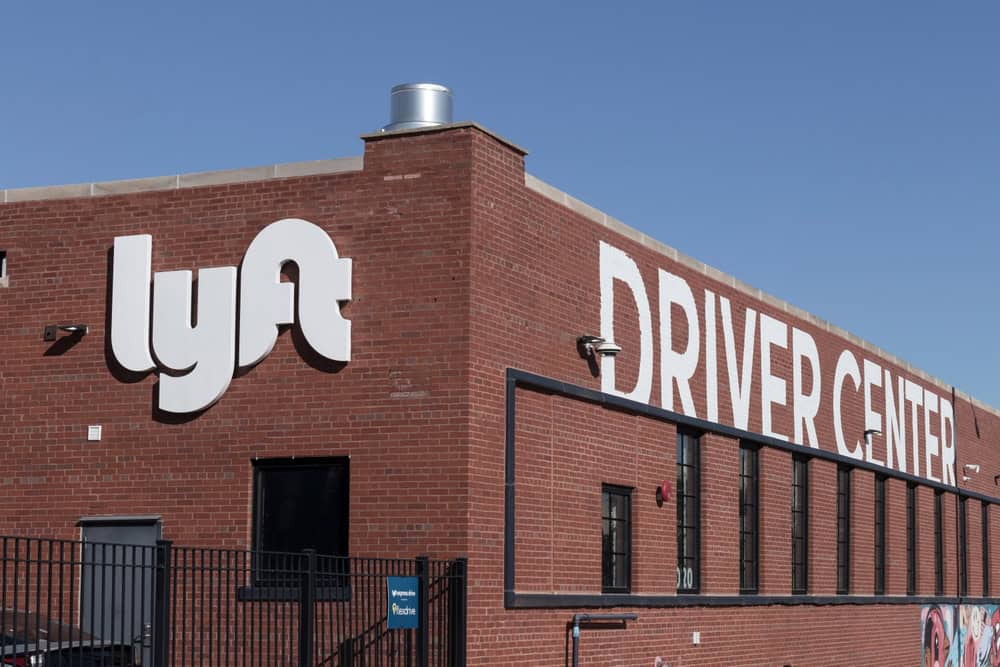
The good news is that survivors of Lyft sexual misconduct and assault incidents are fighting back with lawsuits.
If you or a loved one has been assaulted by a Lyft driver, you are not alone. You may have the right to hold Lyft accountable for its negligence.
The first step in pursuing legal justice and receiving financial compensation is learning what your rights are as a survivor. Pursuing justice takes strength and courage, but it’s a critical step in the healing process and making you feel whole again.
SurvivorsRights.com may help connect you with an attorney who specializes in rideshare assault cases. Our dedicated intake team comprises professionally trained, empathetic individuals based in the USA. When you are ready to contact our intake team, you will be connected with a patient and caring staff member who will securely enter your information.
Filling out the contact form does not mean you are filing a lawsuit. It is simply the first step in understanding your legal rights. Our intake team and the attorneys we partner with understand what you are going through and will treat you as a unique individual, not just a number. By providing your information below, you are under no obligation. Our partner attorneys offer complimentary consultations, and your information is never shared or sold.
Let’s break down what you need to know about Lyft sexual assault lawsuits—including how you can take legal action and seek justice.
Sexual assault in a Lyft ride can take many forms, from unwanted touching to more severe violations of personal body space. Some of the most common circumstances where assaults occur include the following:
As noted above, Lyft has publicly disclosed 6,809 reports of sexual assault. However, these incidents occurred between 2017 and 2022. As of this update in 2025, Lyft has only publicly disclosed sexual assault incident reports from 2017 to 2022. There is no official data from Lyft covering incidents from 2012 (when Lyft launched) to 2017, nor is there any data for 2023 and beyond.
This means the actual number of sexual assaults involving Lyft drivers is likely higher, as the missing years and any underreported cases are not accounted for in Lyft’s available safety reports. If Lyft follows Uber’s lead, a future safety report could reveal additional incidents from 2023 onward, but as of now, that data is unavailable.
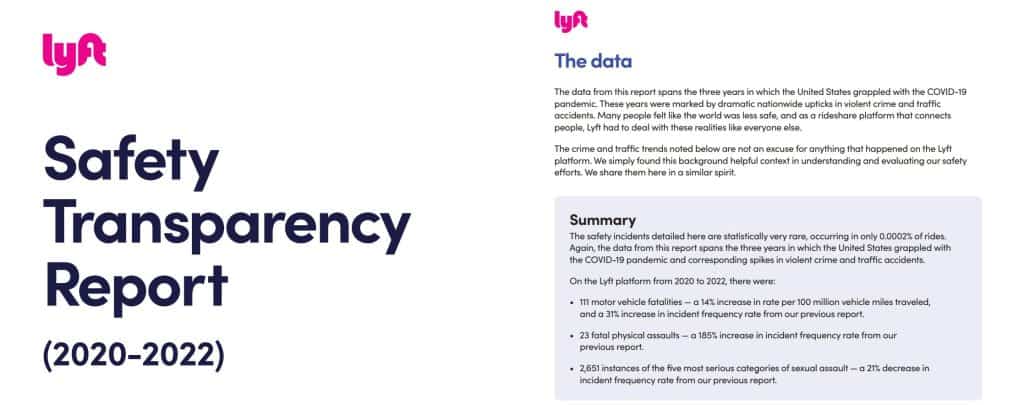
Lyft has publicly stated that it has a zero-tolerance policy for sexual assault and misconduct. The second-largest rideshare company in the United States (it has captured nearly a quarter of the rideshare market), worth $5 billion on the stock market (as of March 10, 2025), encourages riders to report incidents through its app. Lyft claims to investigate every report. However, survivors and legal experts have criticized Lyft’s handling of assault reports, citing:
It may seem unbelievable to survivors of a rideshare sexual assault that at least as of this update (March 2025), Lyft drivers are not fingerprinted. It would be one thing if that were previously the case. Again, Lyft last released a sexual assault safety report in 2022, when 2,651 incidents were reported. One would think that since then, the company would enforce more stringent background checks that include fingerprinting. However, the company continues to conduct only name-based background checks.
Based on company information, Lyft requires all U.S. driver applicants to undergo a criminal background check conducted by a third-party company, Checkr, Inc. This process involves drivers providing consent and a valid Social Security number.
Like Uber, Lyft does not mandate fingerprint-based background checks for its drivers (the one notable exception: New York City). Instead, the company relies on name-based checks.
The International Biometrics and Identity Association (IBIA) is the leading international tech ID trade group. It previously recommended implementing fingerprint-based background checks to both Uber and Lyft. Fingerprinting is much more secure than simple biographical checks, noted IBIA, which published a white paper that included data on the proven accuracy of fingerprint-based background checks and the quick turnaround times to process requests.
Identity Week quoted IBIA’s Managing Director, Tovah LaDier, who said, “There are significant risks in relying solely on a biographic background check.” LaDier added, “Biographic searches are vulnerable to data entry errors and attempts to use false or misleading biographic information to thwart detection.”

To date (March 2025), both Lyft and Uber have stubbornly resisted calls to implement fingerprint-based background checks for their drivers. Despite mounting reports of sexual assaults in rideshare vehicles and growing public outcry, the companies have repeatedly fought against stricter vetting processes. Why? The answer boils down to money, convenience, and control.
Fingerprint-based background checks, like those required for taxi drivers and other licensed transportation workers, provide a far more rigorous screening process than the name-based checks Lyft currently uses. A fingerprint check runs against FBI and DOJ criminal databases, flagging serious offenses that might not appear in basic background screenings.
Lyft, however, argues that fingerprinting discriminates against minorities due to outdated or incomplete arrest records that may not reflect final case dispositions. While some civil rights groups support this argument, critics believe Lyft’s real motive is profit and speed—fingerprint-based checks are more expensive and could discourage drivers from signing up. The more friction in the hiring process, the fewer drivers Lyft has on the road, which affects their bottom line.
Another factor at play is Lyft’s business model. The company classifies drivers as independent contractors, not employees. This distinction is key because deeper screening and oversight could blur the line between contractors and employees, making it easier for courts to argue that Lyft should be held legally responsible for drivers’ actions.
Despite its fierce resistance, California regulators have forced some change. In December 2024, the California Public Utilities Commission (CPUC) mandated fingerprint background checks for drivers transporting unaccompanied minors. This narrow exception proves that Lyft can conduct these checks—but only when legally required to do so.
For all other passengers, Lyft continues to sidestep fingerprint background checks and prioritize rapid driver onboarding over passenger safety.
Yes.
Attorneys handling rideshare sexual assault cases do have a legal leg to stand on with respect to background checks (or lack thereof).
Key Legal Arguments Against Lyft:
Lyft’s refusal to use fingerprint background checks doesn’t automatically make it liable for assaults. But attorneys argue that this failure, along with weak safety policies and keeping dangerous drivers on the platform, paints a clear picture of negligence. In other words, Lyft’s lack of proper screening put passengers at risk—and now the company is being held accountable in court.
Multiple lawsuits have successfully argued that Lyft can be held responsible for failing to take reasonable measures to prevent sexual assaults. Confidential settlements suggest that Lyft prefers to settle rather than risk losing in court, signaling that legal arguments against the company have merit.
Uber is facing hundreds of similar sexual assault cases in a federal court. (1,600 cases as of March 2025). These cases are adjudicated in one U.S. District Court in a multidistrict litigation (MDL). Currently, sexual assault lawsuits against Lyft are being filed and processed individually across various jurisdictions. While there have been discussions about consolidating these cases, no MDL has been established for Lyft as of March 2025.
This means that each case against Lyft proceeds independently.
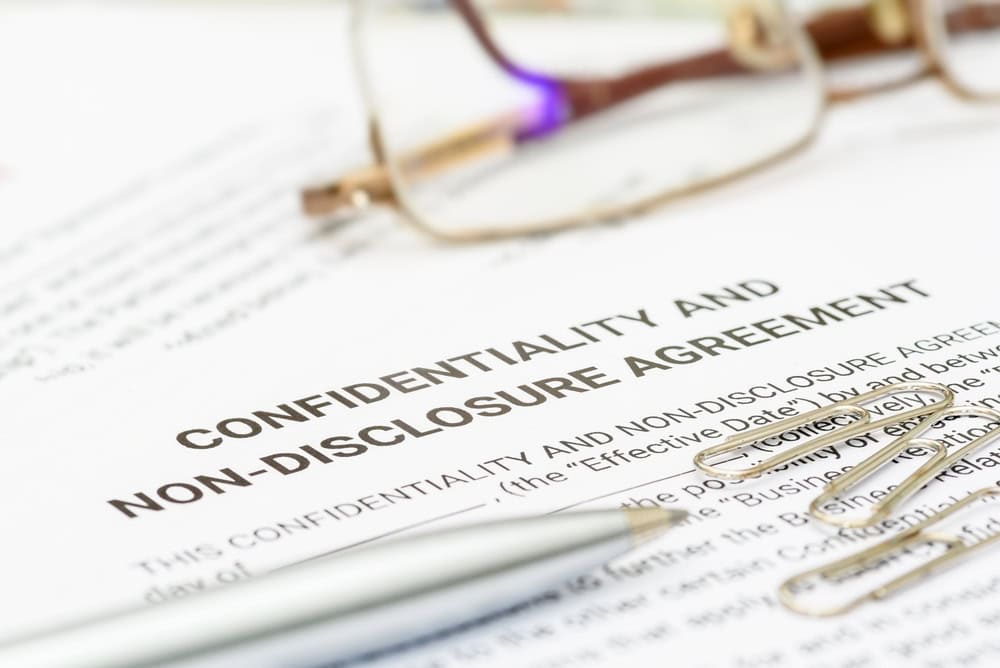
Why not just lump all Lyft sexual assault cases together in a class action? Just as with Uber sexual assault cases, there is no Lyft class action lawsuit. Why not? For starters, if you were sexually assaulted by a Lyft driver and have strong evidence, you wouldn’t want your case lumped into a class action. Survivors in a class action typically receive only pennies on the dollar compared to what they could recover through an individual lawsuit—whether filed in state court or as part of a multidistrict litigation (MDL) in federal court.
Class action lawsuits usually result in a low settlement that, for a billion-dollar company like Lyft, is like a slap on the wrist. (As of mid-March 2025, Lyft was worth around $5 billion on the stock market.) Worse, all members of the class receive the exact same payout (if a settlement is reached), regardless of the severity of their experience.
Class actions work best when all plaintiffs share nearly identical claims, such as a defective product that affects everyone the same way—like faulty airbags or seat belts. Sexual assault cases, however, are deeply personal and unique. Every survivor’s experience, level of harm, and legal argument is different, making class action an unfair approach.
Instead, survivors typically file individual lawsuits against Lyft.
Another reason no class action has been filed against Lyft? Like Uber, Lyft’s Terms of Service prior to 2018 included a class action waiver. Lyft users, when downloading the app, had agreed to resolve disputes through individual binding arbitration rather than participating in class, group, or representative actions. This means that by agreeing to Lyft’s terms, riders waived their right to file or join class action lawsuits against the company. Binding arbitration typically favors companies instead of consumers. For a survivor of a sexual assault, binding arbitration or mediation fails to provide meaningful justice or compensation.
Both Uber and Lyft announced in May 2018 that they were ending mandatory arbitration for sexual assault claims.
However, this raises the question: What if a survivor experienced Lyft driver sexual assault prior to May 2018 when the arbitration clause was waived…can they still file a lawsuit?
The short answer: it depends.
Here are some of the key legal considerations:
If the statute of limitations allows, survivors assaulted before 2018 can still file lawsuits against Lyft.
However, Lyft may try to enforce the arbitration agreement that was in place at the time of the assault.
Some courts have overturned arbitration agreements in cases of sexual assault, ruling that they are unconscionable (grossly unfair).
If a judge invalidates the arbitration clause, a survivor may be able to file a lawsuit in court and, if an MDL exists, be included in the litigation. (As of March 2025, no MDL has been ordered.)
In some cases, courts have ruled in favor of survivors, allowing them to proceed in court despite pre-2018 arbitration clauses.
If Lyft attempts to force arbitration, attorneys may argue that the company’s history of mishandling sexual assault complaints and misleading safety claims make the arbitration agreement unenforceable.
The bipartisan Ending Forced Arbitration of Sexual Assault and Sexual Harassment Act (EFASASHA), commonly known as the #MeToo bill, which was signed into law in March 2022, made it illegal for any company to enforce arbitration for sexual assault claims, even if a survivor had previously agreed to it.
While this federal law guarantees survivors the right to sue, it mainly impacts cases where arbitration agreements were still enforceable. This law means it doesn’t change much for Lyft survivors assaulted after May 2018 but protects those assaulted on or after March 2022 from any future arbitration clauses. In other words, EFASASHA provides extra protection by ensuring Lyft (or any company) can’t reinstate forced arbitration in the future.
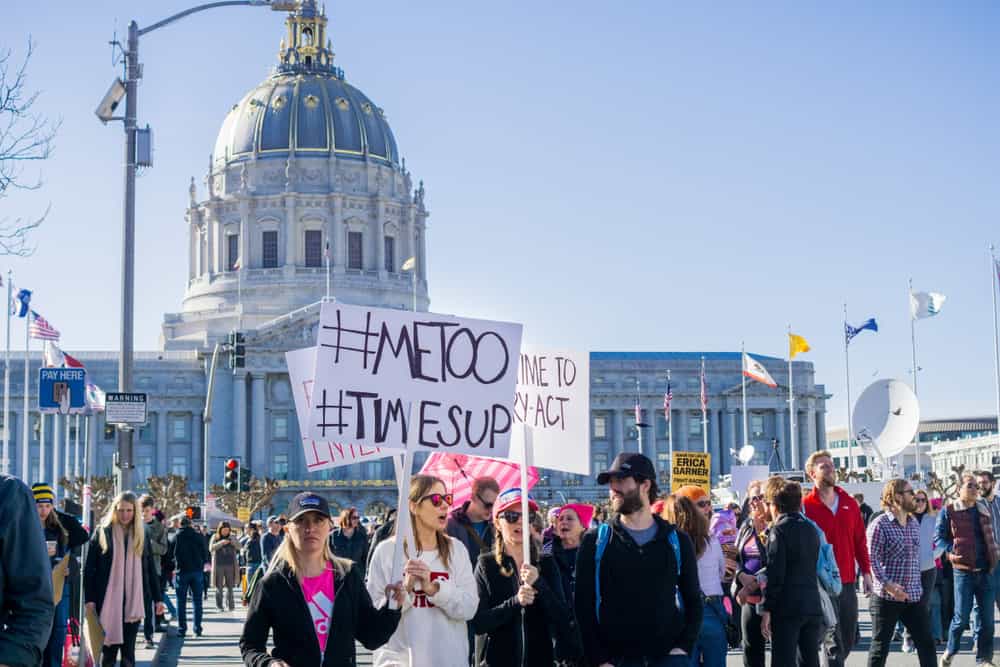
The term “multidistrict litigation” or MDL has been mentioned several times in this guide to Lyft sexual assault lawsuits. This is an important legal term for survivors to understand because an MDL allows multiple lawsuits with similar claims to be consolidated in a single federal court for pretrial proceedings. Why is this beneficial for survivors? This process streamlines evidence gathering, reduces redundant legal costs, and ensures that survivors benefit from shared discovery—meaning attorneys can work together to build a stronger case against Lyft.
If an MDL is eventually established for Lyft sexual assault cases, it could provide survivors with a more powerful and coordinated legal strategy against the company while still preserving their right to an individual settlement or trial.
As mentioned, as of March 2025, no MDL has been established for Lyft sexual assault cases. Whether there’s an MDL in the future depends on if the Judicial Panel on Multidistrict Litigation (JPML) orders the consolidation of Lyft sexual assault cases. The JPML determines whether civil actions pending in two or more federal judicial districts should be transferred to a single federal district court for pretrial proceedings.
As of March 2025, it’s tough to say. An MDL is no guarantee. If enough survivors file lawsuits in multiple federal districts, attorneys may petition for consolidation. Based on cases that share similar allegations, such as Lyft failing to conduct proper background checks or disregarding prior complaints against drivers, centralization is indeed justified.
If the courts become overwhelmed with Lyft sexual assault cases, the JPML may see consolidation as the best way to streamline proceedings, as it did with Uber sexual assault cases. (Uber is a much larger company—$150 billion market cap as of March 2025; Lyft: $5 billion; there are thousands more Uber sexual assault claims.)
Lower case volume than Uber
The Uber MDL (#3084) was created due to the sheer number of cases and lawsuits. From 2017-2022, Uber’s US safety data reported 12,552 incidents of sexual abuse. By comparison, Lyft reported 6,809 incidents over that same period. The main difference is the number of lawsuits. As of March 2025, there are about 3,000 Uber sexual assault lawsuits, with 1,600 consolidated into MDL 3084; the remaining 1,400 or so cases are lawsuits filed within the state court.
Desite Lyft reporting approximately 45% less sexual assault incidents than Uber from 2017-2022, 6,809 is still a significant number. (One incident is one too many!) However, the number of Lyft sexual assault lawsuits that have been filed are a fraction in comparison to Uber.
Why? One reason is that most mass tort attorneys are currently focusing on Uber sexual assault cases (A mass tort is a legal action where multiple plaintiffs file individual lawsuits against the same defendant for similar harm caused by the defendant’s actions or negligence.)
SurvivorsRights.com can help connect you with an attorney who helps Lyft sexual assault victims pursue justice and compensation. The first step in finding out what your legal rights are is to fill out the intake form below.
A Lyft sexual assault MDL could be ordered if more survivors come forward and lawsuits continue to be filed in federal courts. Keep in mind that the number of Uber sexual assault lawsuits very quickly jumped from under 400 to the current (as of March 2025) 1,600.
The number of Lyft sexual assault claims could also spike within a short period of time.
Survivors interested in legal action against Lyft should consult with an attorney to understand their best legal path.
If the steep cost of acquiring an attorney is making you think twice about pursuing legal justice, that is understandable. However, the rideshare assault attorneys we work with do not take any money upfront; they work on contingency. This means they only take a percentage of your settlement or jury award should your lawsuit be successful. In other words, you only pay if you win your case.

If you’ve experienced sexual assault by a Lyft driver, now is the time to take action. You don’t have to navigate this alone—legal help is available. Consulting with an experienced attorney can help you understand your rights, determine the best legal path forward, and fight for the justice and compensation you deserve.
Reach out for a free, confidential consultation today. Your voice matters, and holding Lyft accountable could help prevent future assaults.
By filling out the form below, it’s important to realize that this does not mean you are filing a lawsuit. It is merely the first step in finding out if you have a case and, if so, what your legal options are. If it is determined that you have a case against Lyft, the rideshare sexual assault attorneys we partner with will patiently and clearly explain your legal options. You will be in full control in determining which course you want to pursue.
Yes. Survivors of sexual assault by Lyft drivers can file lawsuits against the company, arguing that Lyft failed to properly vet drivers, enforce safety policies, or act on previous misconduct reports. Survivors may also file lawsuits against the individual driver responsible.
No. Sexual assault cases are highly individualized, and class action lawsuits work best for cases where plaintiffs share nearly identical claims, such as defective products. Instead, survivors typically file individual lawsuits. Eventually, if enough cases are filed in federal court, they may be consolidated into a multidistrict litigation (MDL) for pretrial proceedings.
No. As of March 2025, Lyft sexual assault cases are still being handled individually in various state and federal courts. However, if enough lawsuits are filed in multiple federal jurisdictions, attorneys may petition for an MDL, similar to MDL 3084 for Uber sexual assault cases.
Between 2017 and 2022, Lyft disclosed 6,809 reports of sexual assault. However, Lyft has not released data on sexual assault incidents from 2012-2017 (when it first launched) or 2023 onward, meaning the true number is likely higher.
Several factors contribute to fewer lawsuits against Lyft:
Survivors who win their cases may be entitled to compensation for:
Before May 2018, Lyft required riders to waive their right to sue by agreeing to arbitration. Survivors of pre-2018 assaults may still be forced into arbitration, depending on their case. However, some courts have ruled that arbitration agreements in sexual assault cases are unenforceable. One of our partner attorneys handling rideshare sexual assault litigation will discuss your options with you.
Yes. Many survivors do not report assaults right away due to trauma, fear, or uncertainty. Even if you did not report it to Lyft or law enforcement, you may still have legal options. An attorney can help determine whether you qualify to file a claim.
Every state has a statute of limitations, which is the legal deadline for filing a lawsuit. Some states allow survivors to file lawsuits years after the assault, especially if they were minors at the time. Speaking with an attorney as soon as possible ensures you don’t miss your chance to seek justice.
Not necessarily. Many cases settle before trial, meaning you may not have to appear in court. However, if your case goes to trial, your attorney will support you throughout the process to ensure you feel safe and prepared.
Our rideshare sexual assault attorneys we partner with work on contingency, meaning you pay nothing upfront. They only receive payment if you win your case—either through a settlement or jury verdict.
The first step is filling out the contact form so our intake team can connect you with one of our partner attorneys who understands what you’re going through.
There’s no pressure to move forward, but knowing your legal rights is an important step toward justice.